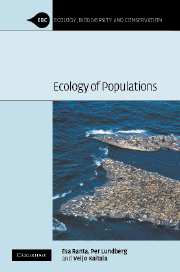Book contents
- Frontmatter
- Contents
- Preface
- 1 Introduction
- 2 Population renewal
- 3 Population dynamics in space – the first step
- 4 Synchronicity
- 5 Order–disorder in space and time
- 6 Structured populations
- 7 Biodiversity and community structure
- 8 Habitat loss
- 9 Population harvesting and management
- 10 Resource matching
- 11 Spatial games
- 12 Evolutionary population dynamics
- 13 Epilogue
- References
- Index
13 - Epilogue
Published online by Cambridge University Press: 02 December 2009
- Frontmatter
- Contents
- Preface
- 1 Introduction
- 2 Population renewal
- 3 Population dynamics in space – the first step
- 4 Synchronicity
- 5 Order–disorder in space and time
- 6 Structured populations
- 7 Biodiversity and community structure
- 8 Habitat loss
- 9 Population harvesting and management
- 10 Resource matching
- 11 Spatial games
- 12 Evolutionary population dynamics
- 13 Epilogue
- References
- Index
Summary
Twelve short chapters, some of them rather superficial, is, of course, not much for a book on the ecology of populations. In most chapters, we have caught glimpses of intriguing and sometimes unexpected population phenomena; in others, we have been able to reach more definitive and firm conclusions and somewhat deeper understanding. This book does not, however, primarily summarize and synthesize; rather, it illustrates a set of approaches and points of departure for studies and analyses yet to be done. This book is a manifestation of ecological and evolutionary significance of dispersal-linkage in spatially structured populations. If the book serves its purpose as a source of inspiration, we have performed well.
The power of modern computers has made it easy to simulate complicated population processes with various sources of environmental stochasticity, population structure, and spatial heterogeneity. That is not to say that we are therefore necessarily closer to a more robust understanding of the ecology of populations, but it helps. Real understanding can only be achieved if there is a theory to aid us in obtaining insights. Such a theory does arguably exist for the temporal structure of population abundance (Turchin 1999; Berryman and Turchin 2001). We have the data, means to analyze them, and the theory to interpret the results for single-population dynamics in uniform space.
- Type
- Chapter
- Information
- Ecology of Populations , pp. 333 - 337Publisher: Cambridge University PressPrint publication year: 2005

